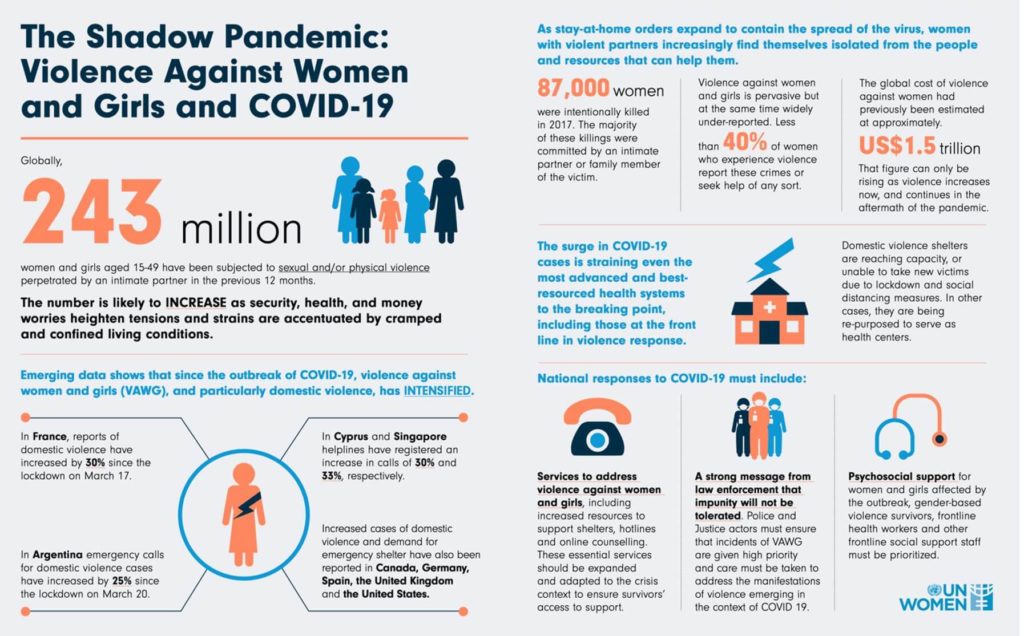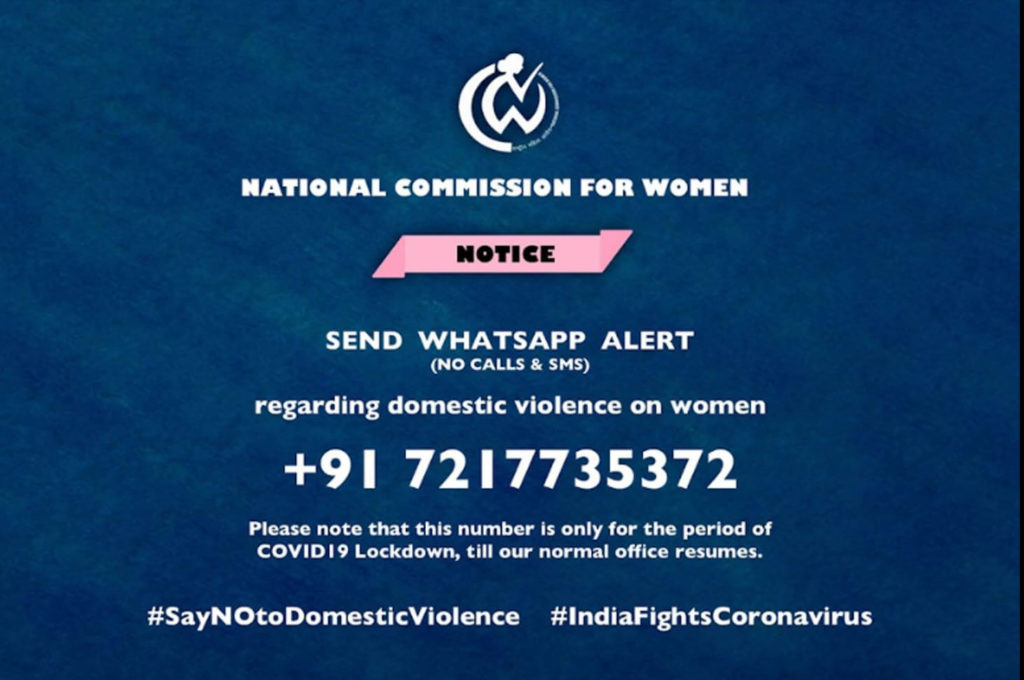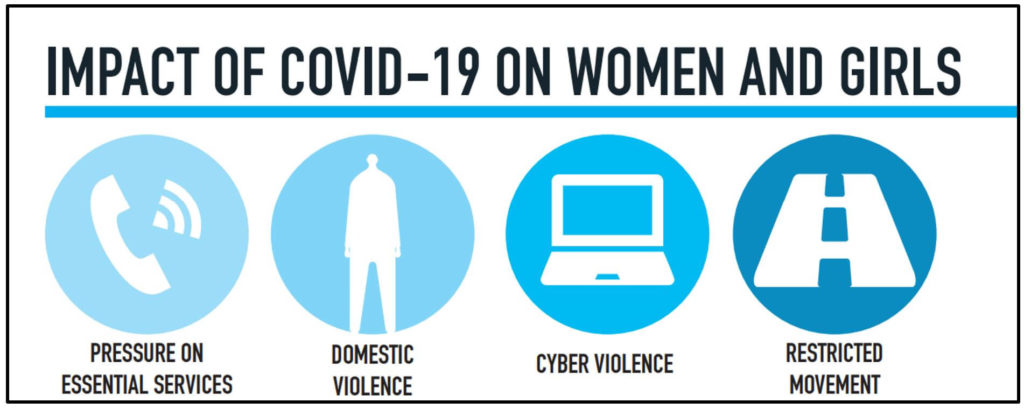As more & more countries announce lockdowns to deal with the COVID-19 pandemic, domestic violence against women & children have seen an increase globally.
As COVID-19 grips nations, Governments across the globe are imposing nation-wide lockdowns to combat the pandemic. Lockdowns confine people to their houses and restrict movement outside houses except for essential items. As more & more people are confined to their homes, there has been an upsurge in the number of cases of violence against women and children globally including India. The executive director of UN Women, in a press statement, referred to the violence against women and girls a ‘shadow pandemic’. UN chief António Guterres also called for measures to address the ‘horrifying global surge in domestic violence directed towards women and girls’ as a result of lockdowns imposed by various nations.
Lockdown due to COVID-19 likely to result in increased domestic violence
According to UN Women, globally in the last 12 months, about 243 million women and girls in the age group of 15 to 49 years have been subjected to physical and/or sexual violence committed by an intimate partner. This amounts to 18% of the women and girls in the age group of 15 to 49 years. The organization has predicted that the scenario of domestic violence is likely to worsen amidst the COVID-19 lockdown due to restricted movement and confinement.
Many countries have reported an increase in the number of cases of domestic violence
France, which has the fourth-highest number of confirmed cases and deaths due to COVID-19, announced a lockdown on 17 March 2020, and since then, there has been a 30% increase in the domestic violence cases according to UN Women. Cyprus, which is an island country in the Mediterranean area, witnessed an increase in calls to helplines by 30%. Similarly, Singapore also recorded a surge in the calls on helplines by 33%. Argentina also reported a 25% increase in the number of emergency calls related to domestic violence. In Lebanon and Malaysia, the calls received on helpline numbers had doubled whereas, in China, the number had tripled as compared to the same month in the previous year since the pandemic broke out.
Even in the developed nations– USA, Germany, Spain, UK, and Canada, similar increasing trends have been highlighted by government authorities, civil society groups, and women’s rights activists. In Australia, according to a Women’s Safety New South Wales survey, 40% of frontline workers had reported increased help requests by survivors. 70% of them had also reported that the cases they received since the outbreak revealed greater complexity.

NCW reports increased cases of domestic violence
The chairperson of the National Commission for Women (NCW), Rekha Sharma stated on twitter that the number of cases of domestic violence reported to NCW in a week since lockdown went up to 69 in addition to those received personally by members of NCW. In an interview, she also stated that the number had more than doubled since lockdown. She further added that more cases were reported in North India as compared to the South. However, it has to be noted that these numbers only pertain to the cases reported to NCW.
Childline India (1098) is a service under the Ministry of Women and Child Development (WCD). The ‘1098’ is an emergency helpline for children, to which cases of child labour, abuse, violence, missing, sexual assault, trafficking and other cases related to children are reported. According to their latest Childline Newsletter, released on 06 April 2020, ChildLine witnessed an increase in calls by 50% amidst the lockdown. From the time lockdown was announced on 25 March 2020, within a week, the helpline received more than 3 Lakh calls. However, the majority of them were seeking information on COVID-19.
UN urges countries to take adequate measures to ensure Women’s safety
The UN has asked all countries to prioritize and incorporate prevention and redressal of violence against women in their national response plans for COVID-19. Shelters and helplines for women are to be made an essential service in all countries, and awareness must also be increased. UN also urged all countries to boost psycho-social support and online counselling with the help of helplines, SMS, online tools and networks, to help women with technology-based solutions. Even NGOs, civil society, and other entities have been urged to take responsibility and support the governments in order to ensure women safety.
New helpline number launched by NCW
To deal with the increasing number of cases, the NCW has launched a new exclusive number to send alerts on domestic violence on women through WhatsApp, during the COVID -19 lockdown period. Further, the WCD Ministry held video conferences with the ‘One Stop Centres’ and they have been asked to ensure the provision of legal and psychosocial aid to the survivors. Both the WCD ministry & NCW have also adopted other means such as videos and infographics to increase awareness and have urged women to come forward and report domestic violence. Measures to ensure mental well-being for children have also been issued by the ministry.

Only one in four countries have laws that specifically protect women from domestic violence
According to UN Women, only 25% of countries have laws that specifically protect women from domestic violence. In India, Protection of Women from Domestic Violence Act, 2005 extends protection to women from domestic violence. The civil law includes physical violence, emotional abuse, sexual abuse, and economic abuse under domestic violence. Section 498 A of the Indian Penal Code makes domestic violence and harassment of women by her husband or his family, for dowry and related matters a criminal offence.
Domestic violence is widely under-reported in India, as well as globally
Domestic violence knows no boundaries. It affects women and girls irrespective of socio-economic conditions, or education background. It is largely under-reported and according to the UN, only less than 40% of women who experience violence seek help. Only less than 10% of the women that seek help go to the police.
There are various reasons for under-reporting. The perpetrator is usually an intimate partner, a family member or someone they know. Fear of revenge on reporting the issues to police can be another reason. Impact on children and family, and social implications are some other factors.
Services supporting women and survivors are also impacted due to lockdown
As a result of the lockdown, women are unable to even temporarily escape from their abusive partners. In the current scenario, women and children may also have difficulties in accessing phones or contacting helpline numbers. Public services are also disrupted- including police, healthcare, justice and other social services since more manpower and resources have to be diverted to contain the pandemic. This disruption in service is at the cost of care and support that needs to be extended to survivors. Clinical management of rape, mental health and psycho-social support are some of the services that survivors need to be provided with.

Global cost of gender-based violence is almost 2% of GDP
It is evident from the statistics that severe measures need to be taken for curbing domestic violence against women and children since the impact of violence is severe. As an individual, a woman’s mental health and physical health will get adversely affected. The global cost of gender-based violence against women and girls has been estimated at almost 2% of the Global Gross Domestic Product (GDP) amounting to USD 1.5 Trillion or Rs. 11.47 lakh crores. Considering that an economic crisis is imminent due to this pandemic, the possible increase in gender-based violence will only add to the crisis. Experiences from the Ebola and Zika outbreak also showed that the most vulnerable groups of women were placed at a higher risk of violence.
Violence against female medical staff and patients is another important issue that needs to be considered by the governments. Women and girls will have to bear the brunt of the pandemic if no timely action is taken to address their concerns.
Featured Image: By Biswarup Ganguly[Creative Commons 3.0]



2 Comments
nice
surprisingly you have not mentioned anything about domestic violence by women agent men. Prejudice, bias and with no law in India that recognize domestic violence against men, life for them is more miserable than women.